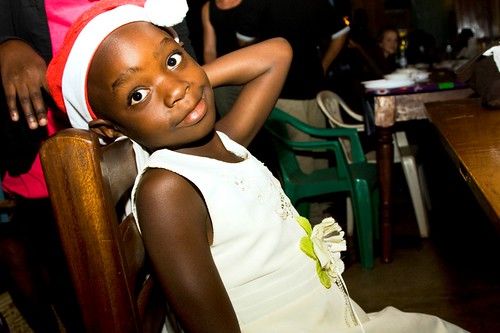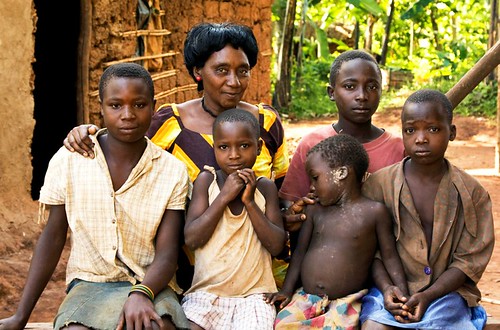“We need to help Sharif look after her baby," I said to Ester last week of the
Maama Muzungu Poultry Farm caretaker.
"She is trying, but I don’t think she quite knows what she is doing.”
Ester nodded.
Ester had been a young mother herself; in fact, younger than Sharif when she had Peanut, just a teenager.
Maybe Ester made similar youthful motherly mistakes, but I suspected not to the same degree; I knew Ester to be very competent and bright.
Ester and I both realized after becoming acquainted with 20 year-old Sharif we would have to guide her through some maternal duties.
Sharif and her baby in front of MMPF
Ester and I had just been to the poultry farm checking on the chicks’ health, taking inventory of feed and monitoring Sharif’s performance; the woman was hard working and serious about her job, she was doing well looking after the chicks and trying to properly care for her baby; but, it seemed, she was facing some challenges with child-rearing.
We spoke with Sharif outside the farm as she held her crying son, the baby sick as usual.
My mind wandered during our conversation attempting to recall an instance when upon my asking about the welfare of her child Sharif had replied he was well.
Sharif handed the boy to Ester and entered the wooden structure to tend to the chicks.
The boy continued to wail in discomfort.
Ester and I inspected him; he still bleed from being circumcised a couple of weeks back.
Sharif emerged from the farm.
“You can’t clothe him in jumpers,” Ester instructed her in Luganda tugging on the boy’s trousers. “You need to put him in a shirt and wrap him in cloth.”
Sharif nodded.
Ester touched the boy’s vaguely discolored face. “He has a rash here too.”
“Yeah, it’s gone away though,” I said to Ester.
“She got treatment for that one and the circumcision last week, but his little wee-wee is still not good.”
I pouted.
"It will be okay if she doesn’t clothe him like this,” Ester told me as Sharif took off the baby’s pants swaddling him in cloth.
Sharif seemed to understand how to better care for her baby after being instructed; I didn’t see him in pants until the wound had healed; however, two days ago when I again inquired about the baby’s health as Sharif and I mixed the chicks’ feed, she replied “He’s not well.
He’s sick.
Malaria.”
I squinted.
“Are you getting treatment?”
“No.”
“Why not?”
“No money.”
“Okay.
When we finish here, we go to town for treatment for the baby."
“Thank you auntie,” Sharif replied genuflecting and returned to shoveling hundreds of kilos of maize bran mixed with nutrients.
Sharif and I passed through the dirt and paved roads to town, her with baby in arms.
We stopped at the fat, kind woman’s pharmacy, the
neyabo who always waives at me eagerly when I pass, the madam who never forgets to ask about my children.
"Mama. How are you?"
"Fine."
“Good.
This one has a sick baby,” I said pointing to Sharif.
“I am going to first check the blood, but we think it’s malaria.
I am leaving now for the hospital with my boy, but please make sure she gets whatever medication she needs.
I will pay you tonight.”
"Okay,” the woman replied and led us through her back door to the lab on the other side of the courtyard.
I approached the short woman at the lab.
“
Neyabo. How are you?”
“Fine.”
“Good.
Please give this one a malaria test for the baby.
Here is the money.”
I handed the woman one thousand shillings then turned to Sharif.
“Sharif.
When you are done here you go back to the pharmacy and get your treatment.
I have to go to the hospital in Buikwe now.
I can’t wait any longer, but they will help you.”
“Thank you auntie.”
“No problem.
Bye.”
I ran off with Richard whose infected leg was emitting a foul odor and was cause for concern.
I rushed to the hospital some twenty minutes from Lugazi only to wait an hour for the
muzunugu surgeons to emerge from the theatre.
The surgeons removed the gauze and looked at Richard’s open wound.
“The leg smelled before, but it is worse now,” the surgeon explained unconcerned.
“We will do the
surgery on like the 17
th.”
“So this isn’t a problem?”
The surgeon shook his head.
“Just be sure to keep him on the Cipro and have the dressing changed every other day.”
“Okay, but you just told me you and the other
muzungus are going to
Mount Elgon in 10 days.
You’ll be gone on the 17th.”
"Oh, yes.
That’s true.
We’ll do it when we get back.”
The surgeons inspected the calendar.
“We’ll do it on the 21
st.”
Fantastic! I was relieved that the smell wasn’t as dire as imagined, and that I was a step closer to having Richard’s surgery completed, although I remained cautiously optimistic.
Still celebrating one medical accomplishment, the following morning I inquired about Sharif and the baby with the fat, kind pharmacist.
“No.
She didn’t come back this today for the injection.”
“What?
You told her to come back though, right?”
The woman nodded.
I went for Sharif.
“Hello Sharif.
Where have you been?” I asked the girl as she approached the poultry farm after my waiting for some thirty minutes.
She replied in Luganda.
The woman on whose property the farm resides explained to me, “her mother called her urgently this morning.”
“Okay, but it’s important the baby gets treatment.
When people don’t complete their doses, that’s how they die.
You finish here then go right away for the injection.”
Sharif’s eyes were wide.
She nodded enthusiastically.
She quickly filled the chicks’ drinkers and off she ran.
“That one has too much going on,” said the property owner as we watched Sharif leave.
“She has the baby, the mother, the chicks.”
“Yeah,” I agreed thinking how she wasn’t unlike other Africans, mainly other
African women, working hard at a job that doesn’t quite make ends meet, attending to her children and parents without spousal support; I agreed thinking how occupied one was looking after five orphans, including a child with a debilitating medical condition, and providing for an African mother and her daughter while running two new businesses and managing six workers in a land rife with cultural differences, exasperating efficiency and inconsistent logic. “But…she’ll be okay,” I shrugged assuredly.
Sharif with her baby and some village kids in front of MMPF



















